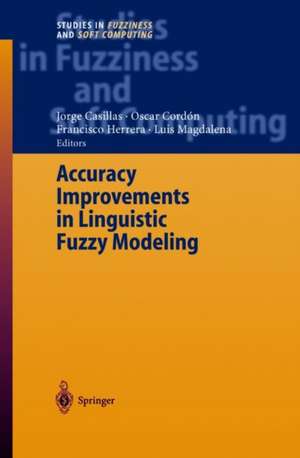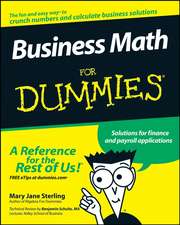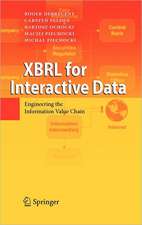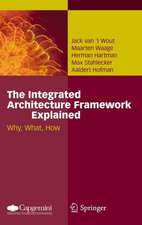Accuracy Improvements in Linguistic Fuzzy Modeling: Studies in Fuzziness and Soft Computing, cartea 129
Editat de Jorge Casillas, O. Cordón, Francisco Herrera Triguero, Luis Magdalenaen Limba Engleză Hardback – 4 iun 2003
| Toate formatele și edițiile | Preț | Express |
|---|---|---|
| Paperback (1) | 949.42 lei 6-8 săpt. | |
| Springer Berlin, Heidelberg – 15 dec 2010 | 949.42 lei 6-8 săpt. | |
| Hardback (1) | 955.70 lei 6-8 săpt. | |
| Springer Berlin, Heidelberg – 4 iun 2003 | 955.70 lei 6-8 săpt. |
Din seria Studies in Fuzziness and Soft Computing
- 20%
 Preț: 999.85 lei
Preț: 999.85 lei - 20%
 Preț: 653.06 lei
Preț: 653.06 lei - 20%
 Preț: 872.98 lei
Preț: 872.98 lei - 20%
 Preț: 930.57 lei
Preț: 930.57 lei - 20%
 Preț: 1051.00 lei
Preț: 1051.00 lei - 20%
 Preț: 992.44 lei
Preț: 992.44 lei - 20%
 Preț: 655.85 lei
Preț: 655.85 lei - 20%
 Preț: 1001.86 lei
Preț: 1001.86 lei - 18%
 Preț: 954.14 lei
Preț: 954.14 lei - 20%
 Preț: 330.10 lei
Preț: 330.10 lei - 20%
 Preț: 333.04 lei
Preț: 333.04 lei - 20%
 Preț: 997.56 lei
Preț: 997.56 lei -
 Preț: 391.61 lei
Preț: 391.61 lei - 20%
 Preț: 647.79 lei
Preț: 647.79 lei - 20%
 Preț: 986.01 lei
Preț: 986.01 lei - 18%
 Preț: 958.56 lei
Preț: 958.56 lei - 20%
 Preț: 996.40 lei
Preț: 996.40 lei - 20%
 Preț: 999.35 lei
Preț: 999.35 lei - 15%
 Preț: 646.43 lei
Preț: 646.43 lei - 20%
 Preț: 651.57 lei
Preț: 651.57 lei - 20%
 Preț: 997.89 lei
Preț: 997.89 lei - 15%
 Preț: 641.03 lei
Preț: 641.03 lei - 20%
 Preț: 1009.74 lei
Preț: 1009.74 lei - 20%
 Preț: 992.62 lei
Preț: 992.62 lei -
 Preț: 388.72 lei
Preț: 388.72 lei - 18%
 Preț: 1223.43 lei
Preț: 1223.43 lei - 20%
 Preț: 651.42 lei
Preț: 651.42 lei - 18%
 Preț: 951.59 lei
Preț: 951.59 lei - 18%
 Preț: 948.61 lei
Preț: 948.61 lei
Preț: 955.70 lei
Preț vechi: 1165.49 lei
-18% Nou
Puncte Express: 1434
Preț estimativ în valută:
182.88€ • 195.55$ • 152.48£
182.88€ • 195.55$ • 152.48£
Carte tipărită la comandă
Livrare economică 18 aprilie-02 mai
Preluare comenzi: 021 569.72.76
Specificații
ISBN-13: 9783540029335
ISBN-10: 3540029338
Pagini: 400
Ilustrații: XII, 385 p. 64 illus.
Dimensiuni: 155 x 235 x 27 mm
Greutate: 0.74 kg
Ediția:2003
Editura: Springer Berlin, Heidelberg
Colecția Springer
Seria Studies in Fuzziness and Soft Computing
Locul publicării:Berlin, Heidelberg, Germany
ISBN-10: 3540029338
Pagini: 400
Ilustrații: XII, 385 p. 64 illus.
Dimensiuni: 155 x 235 x 27 mm
Greutate: 0.74 kg
Ediția:2003
Editura: Springer Berlin, Heidelberg
Colecția Springer
Seria Studies in Fuzziness and Soft Computing
Locul publicării:Berlin, Heidelberg, Germany
Public țintă
ResearchCuprins
Overview.- Accuracy Improvements to Find the Balance Interpretability-Accuracy in Linguistic Fuzzy Modeling: An Overview.- Accuracy Improvements Constrained by Interpretability Criteria.- COR Methodology: A Simple Way to Obtain Linguistic Fuzzy Models with Good Interpretability and Accuracy.- Constrained optimization of genetic fuzzy systems.- Trade-off between the Number of Fuzzy Rules and Their Classification Performance.- Generating distinguishable, complete, consistent and compact fuzzy systems using evolutionary algorithms.- Fuzzy CoCo: Balancing Accuracy and Interpretability of Fuzzy Models by Means of Coevolution.- On the Achievement of Both Accurate and Interpretable Fuzzy Systems Using Data-Driven Design Processes.- Extending the Modeling Process to Improve the Accuracy.- Linguistic Hedges and Fuzzy Rule Based Systems.- Automatic Construction of Fuzzy Rule-Based Systems: A trade-off between complexity and accuracy maintaining interpretability.- Using Individually Tested Rules for the Data-based Generation of Interpretable Rule Bases with High Accuracy.- Extending the Model Structure to Improve the Accuracy.- A description of several characteristics for improving the accuracy and interpretability of inductive linguistic rule learning algorithms.- An Iterative Learning Methodology to Design Hierarchical Systems of Linguistic Rules for Linguistic Modeling.- Learning Default Fuzzy Rules with General and Punctual Exceptions.- Integration of Fuzzy Knowledge.- Tuning fuzzy partitions or assigning weights to fuzzy rules: which is better?.
Textul de pe ultima copertă
Fuzzy modeling usually comes with two contradictory requirements: interpretability, which is the capability to express the real system behavior in a comprehensible way, and accuracy, which is the capability to faithfully represent the real system. In this framework, one of the most important areas is linguistic fuzzy modeling, where the legibility of the obtained model is the main objective. This task is usually developed by means of linguistic (Mamdani) fuzzy rule-based systems. An active research area is oriented towards the use of new techniques and structures to extend the classical, rigid linguistic fuzzy modeling with the main aim of increasing its precision degree. Traditionally, this accuracy improvement has been carried out without considering the corresponding interpretability loss. Currently, new trends have been proposed trying to preserve the linguistic fuzzy model description power during the optimization process. Written by leading experts in the field, this volume collects some representative researcher that pursue this approach.
Caracteristici
Focused on linguistic fuzzy rule-based modeling Reader will acquire a deep knowledge on practical topics such as linguistic system identification with fuzzy systems and accuracy State of the art on the trade-off betwen interpretability and precision in fuzzy rule-based modeling Includes supplementary material: sn.pub/extras













